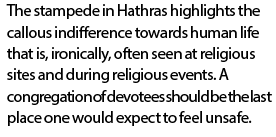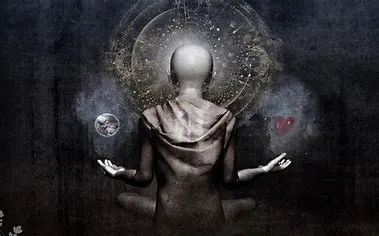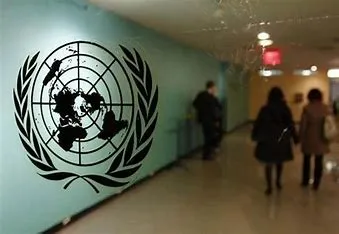Matthew Harrison Brady: “We must not abandon faith! Faith is the most important thing.”
Henry Drummond: “Then why did God plague us with the capacity to think? Mr. Brady, why do you deny the one faculty of man that raises him above the other creatures of the earth, the power of his brain to reason? What other merit have we? The elephant is larger, the horse is swifter and stronger, the butterfly is far more beautiful, the mosquito is more prolific. Even the simple sponge is more durable. But does a sponge think?”
Above mentioned are the quotes of the two lawyers debating in a courtroom with regards to evolution, logic, reason and faith in the 1960 film – Inherit the Film. Well, when it comes to questioning blind faith on something that doesn’t exist, the common people in the society don’t seem apply common sense when it comes to right
Coming from a country that has religion, idols, and ‘godmen’ among its priorities, stampedes don’t surprise me anymore. Too many have happened in the past, and more will probably happen in the future though one wishes otherwise. But the most important question is never answered, because no one asks: When will we ever get over the blind beliefs or faith that make us ignore safety hazards?
The stampede in Hathras highlights the callous indifference towards human life that is, ironically, often seen at religious sites and during religious events. A congregation of devotees should be the last place one would expect to feel unsafe. Or so the 120 victims who came to attend Bhole Baba’s ‘satsang’ must have thought. Bhole Baba, formerly constable Suraj Pal, is in the wind. He has not expressed sympathy, much less remorse. Nor is he mentioned in the FIR, according to media reports. He thrives on the faith of his followers, but he is not responsible for their fate.
What attracts people to these peddlers of faith? Why the desperate need to believe that anyone has a quicker channel to God than you do? Those frantically looking for a peg to hang their faith on, are actually more the victims of their own need than of the wiles of conmen. If you have a strong belief in your own self and faith in your thoughts, values and actions, you become impervious to the perceived power of another. You then do not need another.

While writing this piece, I have a feeling of Déjà vu. A similar incident happened last year in Indore, in the central state of Madhya Pradesh. At least 36 people died when a slab constructed on top of an ancient ‘bawdi’, or well, collapsed during a ‘havan’ programme held on the occasion of Ram Navami at a temple. People were quick to protest outside the temple, blaming the government for the incident. But what led to the incident? Not only was the well old but the construction was illegal, and done without the notice of the Indore Municipal Corporation. If I think of it, I will look at it as: when a restaurant is considered to be good, the owner tries to enlarge the accommodation. So did the temple trust. Just so that it could accommodate more devotees and gain more offerings.
Blame the Indore Municipal Corporation (IMC) as much as you want, but do you think the government or their “decisions” have ever stopped a religious or spiritual organisation that has “supporters” from doing something? Had the IMC stopped the construction, it would have been slammed as atheists, and creating a ruckus before still constructing the illegal slab would have been the way out.
The question then arises, why do people continue to place their trust in such dubious characters despite ample evidence of their deception? One explanation lies in the human tendency for seeking solace and direction in life during the period of uncertainty and instability. When confronted with life’s complexities, many turn to religion and spirituality for guidance and reassurance. This may be for getting out of poverty, illness, married issues and various other social miseries. Ironically this blind faith is not confined to poor, illiterate or semi-literate classes only. Such bind faith is exhibited by all sections of people, viz. politicians, bureaucrats, well to do families as each person some has favour some to ask from such godmen. In such contexts, individuals are more susceptible to manipulation by those who exploit their ignorance and desperation for personal gain.
However, this quest for enlightenment can many a times mislead the followers, as they fall victim to the false narratives and assurances that promise solutions to their problems.
Bhole Baba’ donned many hats and tried various professions — ex-cop, intel officer and farmer — before his supposed “divine encounter”. He is now an absconding criminal. So, when the families of the dead and injured need it the most, they don’t have anyone. Viral videos from hours after the incident have shown family members of the victims pleading for ambulances, senior officers, or any kind of medical help to just placate the chaos that had fallen upon them.
However, we all have a deep, innate need to belong to someone or something. We also need to matter. We want our lives to have a meaning and purpose. Nobody dreams of being one amongst millions; we all wish to have a unique identity and to know that our existence matters. It is this desperate need for anchors that is exploited by fake Babas and Matas. India being home to the world’s largest population of illiterates and a sizable population below the poverty line doesn’t help either. Being part of a cult or dera gives a false sense of meaning and purpose to people who have no other hope. Attaching yourself to a cult gives you an identity of sorts. The half-baked gyan spouted by the Babas helps to keep your hopes going, with a promise of heaven, always in the future.
But it isn’t just the poor and the illiterate who are hoodwinked by imposter Babas. What about their rich followers who are the financial backbone of these vice dens? These people who have everything materially, lack happiness and hope. Kings and queens of a hollow world devoid of substance and happiness, they seek the elusive in the aura of these conmen. The self-proclaimed Godmen also act as a conduit between politicians and their rich followers, using their smart networking system to help all. In fact the deras and satsangs are great places for networking.
These men have all the qualities of good political leaders – they are great orators and good at the art of conning. They show concern, try and help their weak followers and also indulge in social work. They ensure a rich patronage and buffer themselves up with a good political connect. That works well because politicians use them right back as political vote banks.
The recent stampede at a religious event in Hathras, which claimed over 116 lives and injured many more, is a stark reminder of the dangers of unchecked crowds and the limitations of our law enforcement agencies. While it is easy to point fingers at the police and administration for the tragedy, the truth lies in a complex web of factors that led to this unfortunate incident.
First and foremost, it is essential to acknowledge that the police were caught between a rock and a hard place. Had they tried to stop the crowd from entering the pandal, they would have been accused of discriminating against a particular community. And when they tried to manage the crowd, they were overwhelmed by the sheer numbers. No police force in the world can handle a crowd of such magnitude, especially when it is fueled by blind faith and lack of awareness.
The real culprit here is the lack of planning and coordination among the event organizers, the administration, and the police. How could they not anticipate the massive turnout, despite having experience with similar events in the past? Why was the venue not designed to accommodate the expected crowd? These are questions that need to be answered.
Furthermore, the incident exposes the darker side of our society, where people are willing to risk their lives to attend an event that promises spiritual enlightenment or salvation. This blind faith leads to a lack of accountability and a disregard for basic safety protocols. We need to introspect and ask ourselves: are we so desperate for spiritual solace that we are willing to compromise our safety and well-being?
It is up to the society to address these underlying issues through education and empowerment initiatives, equipping individuals with the tools they need to discern truth from falsehood and resist the influence of falsehoods. There is also need to support scientific temper in the society, instead of supporting superstition and quackery.
The writer is an Associate Professor in Seedling School of Law and Governance, Jaipur National University, Jaipur.























